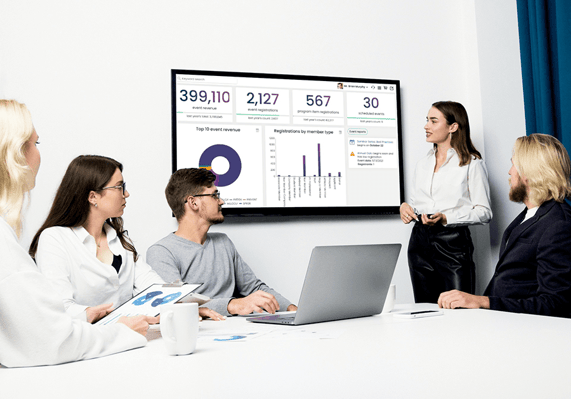Data is everywhere. From the apps we use to the products we buy, data is being collected at every turn.
“Data analytics is the future, and the future is NOW! Every mouse click, keyboard button press, swipe or tap is used to shape business decisions. Everything is about data these days. Data is information, and information is power.”
- Radi, data analyst at CENTOGENE
With the rise of Big Data, it's no surprise that many associations and member-centric organizations have become increasingly data-driven. While data can be incredibly valuable, it's important to remember that there's a fine line between being data-driven and being data conscious.
Being data-driven means using data to make decisions. While this approach can be effective, it can also be limiting. When we rely solely on data, we risk overlooking important factors that can't be quantified. For example, data may tell us that a certain resource or event is popular, but it may not tell us why. By being data conscious, we can take a more holistic approach to decision making that considers both quantitative and qualitative factors.
Let’s explore five reasons why your association should be data conscious, not just data driven:
Five Reasons Why Your Association Should Be Data Conscious, Not Just Data Driven
1. Data can be biased
Data is not neutral. It reflects the values and biases of the people who collect it. Bias in data can arise from a variety of sources, including the way data is collected, processed, or analyzed. If we rely solely on data to make decisions, we risk perpetuating these biases. By being data conscious, we can question the data we're using and ensure that it's not perpetuating harmful biases.
Your association should always define clear objectives for each data point to be collected and ensure consensus for its purpose and use.
2. Data doesn't tell the whole story
 Data can provide us with valuable insights, but it doesn't always tell us the whole story. For example, data may tell us that a certain member recruitment campaign was successful, but it may not tell us how members actually felt about the campaign. By being data conscious, we can look beyond the numbers and consider the human factors that are often left out of data analysis.
Data can provide us with valuable insights, but it doesn't always tell us the whole story. For example, data may tell us that a certain member recruitment campaign was successful, but it may not tell us how members actually felt about the campaign. By being data conscious, we can look beyond the numbers and consider the human factors that are often left out of data analysis.
“Data are just summaries of thousands of stories—tell a few of those stories to help make the data meaningful.”
- Dan Heath, bestselling author
3. Data can be overwhelming.
Today, we have access to more data than ever before. While this is generally positive, it can also be overwhelming. By being data conscious, we can focus on the data that's most relevant to our decision making and avoid being bogged down by irrelevant data.
“Data is like garbage. You’d better know what you are going to do with it before you collect it.”
~ Mark Twain
It's easy to fall into the trap of collecting as much data as possible. With so many tools available for data collection, it can be tempting to gather as much information as you can, in the hopes that it will be useful later on. However, collecting too much data can quickly become overwhelming.
Consider these questions in relation to your association’s data practices:
- How much time is your staff spending collecting, storing and managing your members’ data?
- How much member data are you collecting?
- How is the member’s data being used?
- Do you have data consistency or are there a lot of errors?
- Are you mindful of the types of data being collected?
- Is the member’s data sensitive?
- Is your member’s data stored in-house or in the cloud?
- Are you incurring costs for the amount of member data you store?
4. Data can change quickly.
Data is constantly changing. What was true yesterday may not be true today. By being data conscious, we can stay up to date with the latest data and avoid making decisions based on outdated information.
“No data is clean, but most is useful.”
~ Dean Abbott, Co-founder and Chief Data Scientist at SmarterHQ
 As associations collect, analyze, and use vast amounts of data to make critical business decisions, their increased use of multiple data sources, different teams using different tools, and disparate systems, staff often struggle with data quality and consistency. This is where the importance of establishing a Single Source of Truth (SSoT) comes in.
As associations collect, analyze, and use vast amounts of data to make critical business decisions, their increased use of multiple data sources, different teams using different tools, and disparate systems, staff often struggle with data quality and consistency. This is where the importance of establishing a Single Source of Truth (SSoT) comes in.
An SSoT is a centralized location that stores all an organization's data in a consistent, reliable, and accessible format. This means that everyone in the association has access to the same information and can be confident that it is accurate and always up to date.
Then there’s the topic of data integrity: the accuracy, consistency, and reliability of your members' data throughout its lifecycle with your association. It involves ensuring that the data is complete, correct, and secure, and that it can be trusted to make decisions or inform analysis.
Are your staff making use of data hygiene best practices and utilizing dashboards to showcase gaps and errors in your data?

5. Data can't replace human judgment.
While data can provide us with valuable insights, it can't replace human judgment. By being data conscious, we can use data to inform our decisions, but we can also rely on our own judgment and experience to make the best decisions.

Adopting a Holistic Approach to Decision Making
While data can be incredibly valuable, it's important to remember that it's not the only factor to consider when making decisions. By being data conscious, you can take a more holistic approach to decision making that considers both quantitative and qualitative factors. This can help you avoid the pitfalls of being overly data-driven and ensure that you're making the best decisions for your association.
Quote source: 23 Must-Read Quotes About Data by CareerFoundry